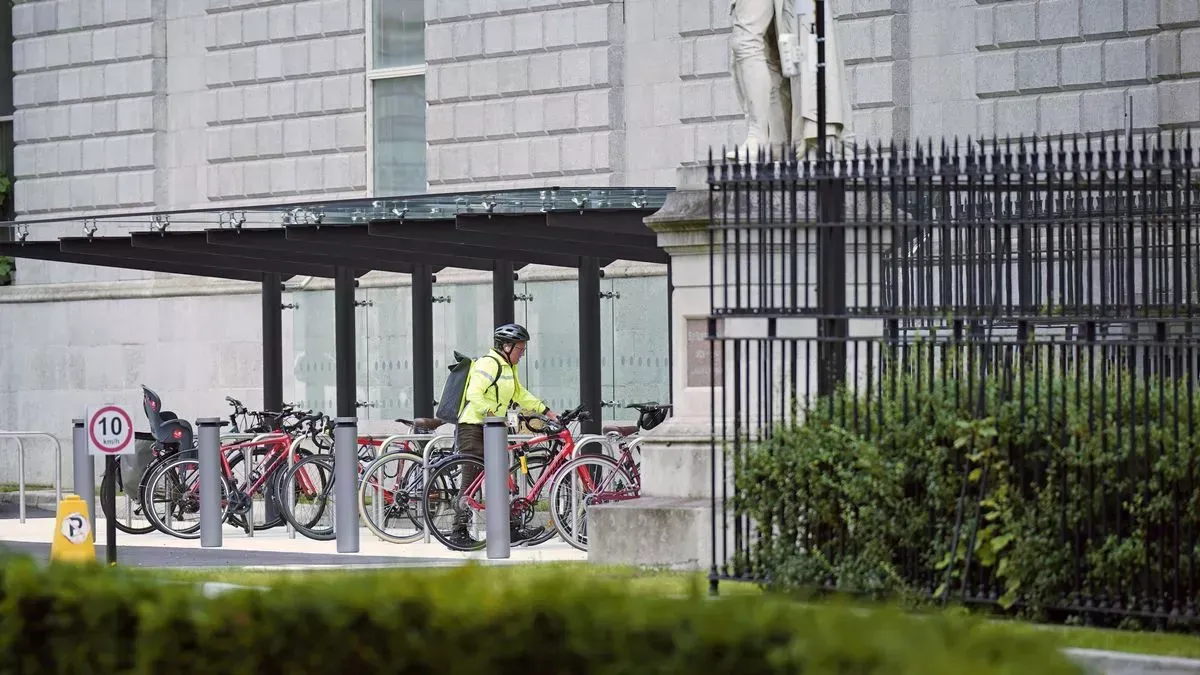Ireland's €336,000 Parliament Bike Shelter Sparks Controversy
Ireland's government faces backlash over a €336,000 bike shelter at Leinster House. Officials express shock at the cost, calling for an immediate review of the project initially praised for environmental reasons.

In a controversial move, Ireland has invested €336,000 (£283,300) in a bicycle shelter capable of accommodating just 18 bicycles at Leinster House, the seat of the Irish parliament in Dublin. This expenditure has sparked significant debate and criticism among government officials and the public alike.
Simon Harris, Ireland's Taoiseach (Prime Minister), expressed his dismay at the cost, describing it as "inexcusable and inexplicable." Harris, who became Ireland's youngest Prime Minister in April 2024, welcomed an immediate review of the spending, which was promptly ordered by Kieran O'Donnell, the Minister for Public Works, on Tuesday, September 3, 2024.
The structure, initially hailed as a positive step towards environmental action in the public sector, has come under scrutiny for its design and effectiveness. Members of Parliament pointed out that the shelter is not even a fully enclosed shed, but rather an L-shaped canopy that may not adequately protect bicycles from rain.
Helen McEntee, the Justice Minister, echoed the sentiment of many when she stated that the amount spent seemed "astronomical for what is essentially a bike shed." This reaction highlights the disconnect between the project's intentions and its execution.

The Office of Public Works defended the high cost, citing "unique challenges" associated with constructing on the grounds of Leinster House, a protected structure of national importance. They emphasized the use of durable materials such as Irish granite, glass, and steel, chosen for their compatibility with the historic setting.
A breakdown of the costs revealed that €322,282 was allocated for construction and installation, with additional expenses for archaeological services and quantity surveying. Notably, the total cost of the shelter is comparable to the average price of a new house in Dublin, which stood at around €425,000 in 2023.
This controversy comes at a time when Ireland is making significant strides in its climate action efforts. The country has committed to reducing greenhouse gas emissions by 51% by 2030 and has set ambitious targets for renewable energy and sustainable transportation. The government's Climate Action Plan aims to increase the number of electric vehicles to 945,000 and develop 310km of segregated bike lanes in Dublin by 2030.
Eamon Ryan, a Green Party minister in the coalition government, who had initially praised the shelter on environmental grounds in April 2024, expressed shock at the final bill. The Green Party, which has been part of Ireland's coalition government since 2020, finds itself in a difficult position, balancing environmental initiatives with fiscal responsibility.
Neasa Hourigan, a Green Party MP and architect, criticized the project's cost-effectiveness, stating that it should have been completed for half the price. She pointed out the irony of the situation, noting that the shelter's design might not even fully protect the bicycles from the elements.
This incident has raised questions about the allocation of resources in Ireland's fight against climate change. While the country has made commendable commitments, such as planting 440 million trees by 2040 and aiming for 70% renewable electricity by 2030, the bike shelter controversy highlights the need for more cost-effective and practical solutions in achieving these goals.
As Ireland strives to create 500,000 additional sustainable journeys per day by 2030, the government faces the challenge of implementing environmentally friendly initiatives without incurring excessive costs. The bike shelter at Leinster House serves as a reminder of the delicate balance between environmental action and fiscal responsibility in the public sector.
[[Simon Harris, Ireland's Taoiseach]]
"People get that. What they don't get is the extraordinary sum of money that this has cost, and I don't either quite frankly. This is the sort of thing that rightly angers and annoys people and it angers and annoys me as well."
As the review of the project unfolds, it remains to be seen how this incident will impact future environmental initiatives in Ireland's public sector. The controversy serves as a cautionary tale, emphasizing the importance of transparency, cost-effectiveness, and practical design in government-led environmental projects.


































